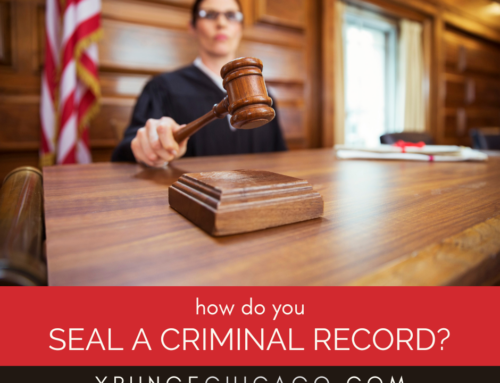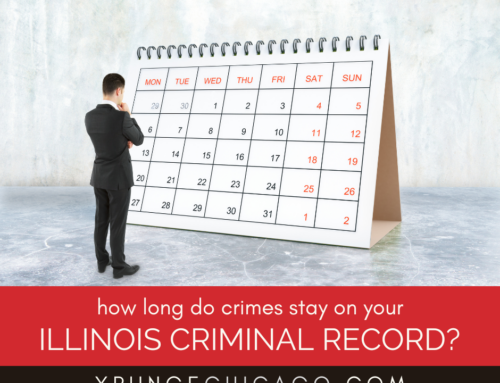
In Illinois, the law sets clear boundaries on which criminal records can be expunged. Violent crimes typically fall outside these boundaries due to their nature and the implications for public safety. This guide will delve into why the law maintains these records and how sealing other types of convictions can still be a viable option for those looking to mitigate the impact of their criminal history.
Why Can’t You Expunge Violent Crimes in Illinois
The expungement process in Illinois is designed with public safety and the integrity of the criminal justice system in mind. This guide explains the following:
- The legal framework that excludes violent crimes from expungement
- The rationale for keeping violent crimes on a person’s record
- How sealing differs from expungement and what it offers
- The types of convictions that are typically eligible for sealing
- The importance of consulting with a lawyer for sealing convictions
Here’s a closer look at each.
The Legal Framework That Excludes Violent Crimes from Expungement
In Illinois, the statutes governing expungement are clear: violent crimes generally do not qualify for this form of record clearing. The law categorizes offenses based on their severity and the potential impact on public safety. Violent crimes, due to their nature, are placed in a category that is typically excluded from expungement. This includes offenses such as aggravated assault, robbery, and other crimes that involve harm or the threat of harm to individuals. The statutes are designed to ensure that records of these serious offenses are preserved, reflecting the state’s commitment to public safety and the administration of justice.
The Rationale for Keeping Violent Crimes on a Person’s Record
The rationale for maintaining records of violent crimes is multifaceted. Primarily, it serves the public interest by ensuring that individuals who have committed serious offenses are identifiable in legal and certain professional contexts. This transparency helps to protect the community by allowing for informed decision-making in matters of public interaction and safety. Additionally, keeping these records accessible upholds the rights and considerations of victims who may need to be aware of the offender’s status for personal security or legal reasons. The enduring presence of these records in the criminal justice system also serves as a potential deterrent to future offenses and as a factor in sentencing for any subsequent crimes.
How Sealing Differs from Expungement and What It Offers
While expungement is not an option for violent crimes, sealing is a different legal remedy that can offer benefits. Sealing a record means that it is hidden from most public searches, although it remains accessible to law enforcement and the criminal justice system.
The Types of Convictions That Are Typically Eligible for Sealing
In Illinois, the opportunity to seal a conviction offers a significant benefit to those with certain types of criminal records. Generally, non-violent offenses, particularly those that do not involve serious bodily harm or sexual misconduct, are eligible for sealing. This can include drug offenses, theft under certain circumstances, and other property crimes that did not result in injury. The law also allows for the sealing of some misdemeanor convictions and specific felonies after a designated period of time has passed without further incidents of criminal activity.
The eligibility for sealing is subject to specific criteria, such as the completion of any sentence, including probation or parole, and the absence of pending charges. The process involves filing a petition with the court, and the court has discretion to grant or deny the request based on the details of the case and the individual’s history. Sealing these types of convictions allows individuals to move past their criminal history, providing them with greater opportunities for employment, housing, and education, which are often hindered by background checks revealing a criminal record.
The Importance of Consulting with a Lawyer for Sealing Convictions
The process of sealing convictions is intricate, involving detailed legal paperwork, strict deadlines, and often, court appearances. An experienced lawyer plays a crucial role in this process. They can provide a clear understanding of the law, evaluate whether a conviction is eligible for sealing, and help gather the comprehensive documentation required to support the petition.
Legal counsel is also instrumental in presenting the case before the court. They can articulate the reasons why sealing the record is justified and argue how it serves the interests of justice and the individual’s rehabilitation. A lawyer’s advocacy can be the difference between a sealed record and one that continues to impact an individual’s life. They can also advise on the potential implications of sealing, such as how it will affect future employment opportunities and the individual’s rights in regard to disclosing their criminal history.
FAQ About Sealing Convictions in Illinois
Check out these commonly asked questions about sealing convictions in Illinois. If you don’t see the answers here, please call our office and we’ll get you the information you need.
What Is the Difference Between Expungement and Sealing?
Expungement and sealing are two legal processes that protect your privacy after you’ve been involved in the criminal justice system. Expungement is the more comprehensive of the two, effectively erasing offenses from your record as though they never happened. This means that, once a record is expunged, you don’t have to disclose the offense on job applications or other documents. Sealing, on the other hand, doesn’t erase the record but makes it much less accessible. Your sealed record won’t show up in most background checks, which can make it easier to get a job, apply for housing, or achieve other personal goals. However, sealed records remain available to the criminal justice system, including law enforcement and the courts.
Are Any Violent Crimes Eligible for Sealing?
While the general rule in Illinois is that violent crimes are not eligible for sealing, there are exceptions based on specific circumstances and the details of the offense. For instance, some older convictions or those that have certain mitigating factors may be considered for sealing. It’s important to consult with a lawyer who can review the specifics of your case and provide accurate advice on whether your violent crime conviction may be eligible for sealing. The lawyer will assess factors such as the time that has passed since the conviction, your criminal record since the conviction, and the specific laws that apply to your case.
How Do I Know If My Conviction Can Be Sealed?
Determining if your conviction is eligible for sealing involves a review of the specific Illinois statutes that apply to your case, as well as an analysis of the details of your offense. A lawyer can help you navigate this process by examining the nature of your conviction, the time that has passed, and any subsequent criminal activity. They will also consider other factors, such as your personal history and contributions to the community, which can influence the decision in a sealing case. The lawyer’s role is to provide a clear understanding of your eligibility and to assist in the preparation of your case to increase the likelihood of a favorable outcome.
What Are the Benefits of Sealing My Criminal Record?
Sealing your criminal record can open up a range of opportunities that might otherwise be closed to you. With a sealed record, you’re more likely to pass background checks for employment, which can lead to better job prospects and a more stable financial future. Housing opportunities also expand, as many landlords conduct background checks on potential tenants. Additionally, sealing can help with educational aspirations, as some colleges and universities consider criminal history in their admissions processes. Overall, sealing your record can significantly reduce the stigma and barriers associated with a criminal past, allowing you to move forward more freely in your life.
Can Sealed Records Ever Be Accessed?
Yes, sealed records can still be accessed, but the accessibility is restricted to certain entities. Law enforcement agencies, courts, and some employers in sensitive positions can request access to sealed records. This means that while your record won’t be visible to the general public or most employers, it is still available for legal and security purposes. If you’re applying for a job that requires a high level of security clearance, for example, your sealed record might be considered as part of the vetting process. It’s also possible for sealed records to be used in future legal proceedings, although they are not as readily available as unsealed records.
Do You Need to Talk to an Attorney About Expungement or Sealing?
If you’re tired of your criminal past coming back to bite you, we may be able to help. Call us right now at 847-920-4540 or fill out the form below so we can talk about your case.
Oops! We could not locate your form.















